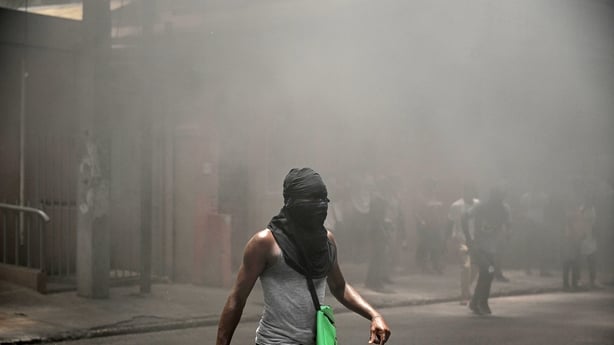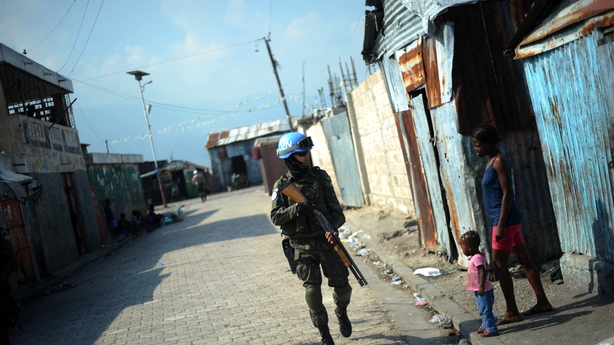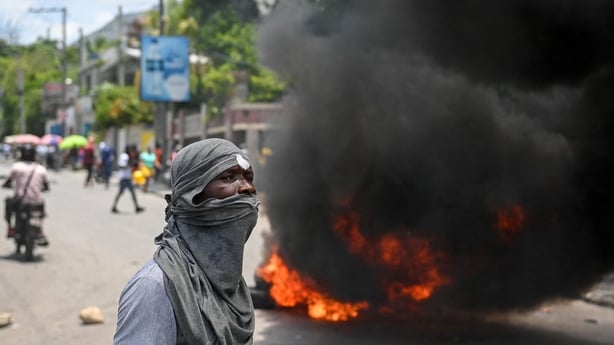When UN Secretary General António Guterres returned from a visit to Haiti this summer, he said the people there are "trapped in a living nightmare."
Humanitarian conditions are "beyond appalling," he said, and "brutal gangs have a stranglehold" on the population of nearly 12 million.
The UN reports kidnappings and abductions for ransom have seen an "alarming spike." Women and girls face "extreme sexual violence."
From the beginning of this year until the middle of August, more than 2,400 people in Haiti were reported killed, more than 950 kidnapped and another 902 injured, according to Ravina Shamdasani, spokesperson for the UN High Commissioner for Human Rights.
A UN humanitarian aid plan for Haiti, which requires $720 million, has received less than a quarter of the funding needed.
"In some weeks, there are more civilians killed in Haiti than there are in Ukraine," William O’Neill the UN independent expert on human rights in Haiti, who has worked periodically there since the 1980s, told RTÉ News.
"I’ve never seen it as bad," he added.
The Secretary General reiterated calls for the Security Council to mandate a multinational force to help the Haitian authorities quell the violence, something Haiti’s prime minister, Ariel Henry, has been asking for since last October.
So why the delay?
The simple answer is that no country wants to do it.
Apart from the obvious risk of casualties in taking on Haiti’s heavily-armed gangs, the reluctance is, in part, an acknowledgement of the long and sorry history of international intervention in Haiti, dating back to the birth of the state.

Great power meddling
Haiti was the first country in the world to ban slavery, following an uprising in 1791.
But for that, they paid a heavy price.
French gunboats forced the newly-free nation to agree to pay crippling reparations to former slaveowners. It would take Haiti more than a century to pay off the debt, skewering its early development.
"The world's greatest powers, which at that point were England, France, the US, were all dedicated to Haiti not surviving," said Gregory Grene from Co Cavan whose charity, the Andrew Grene Foundation runs a school in one of the poorest districts of Haiti’s capital, Port-au-Prince.
The charity was set up in memory of Grene’s twin brother, Andrew, who died in the 2010 earthquake while working for the UN.
"None of the great powers wanted to see a slave republic go ahead," Mr Grene said, for fear of inspiring slave rebellions in their other colonies or at home.
Later, as World War I raged in Europe, the US began its 19-year occupation Haiti, during which they removed much of the country’s financial assets to New York banks and brutally suppressed any opposition to US control.
When US forces withdrew in 1934, Haitians were "close to starvation level," according to a later UN report.
In the latter part of the 20th century Haiti was ruled by a series of brutal dictators, including François "Papa Doc" Duvalier and then his son "Baby Doc." The regime was propped up by the West as a bulwark against communism during the Cold War.
UN peacekeeping turns tragic
At the turn of the 21st century, UN peacekeeping missions saw considerable success establishing some stability.
But the earthquake hit in 2010.
Hundreds of thousands of Haitians died and many more were injured. 102 UN personnel were killed when the building housing the mission there collapsed – the single greatest loss of life in the agency’s history.
In the quake’s aftermath, the United Nations increased the number of peacekeepers in Haiti.
But the UN troops inadvertently introduced cholera which went on to kill at least 10,000 Haitians.
Peacekeepers were also found to have sexually abused women and children. Women who were impregnated and abandoned by peacekeepers have long sought compensation.
The UN withdrew its peacekeeping operation in 2017.

Since then, gang warfare exploded, ramping up since the assassination of the president Jovenel Moise, in 2021.
It is so bad, many Haitians would now welcome a UN intervention, despite its chequered history, experts say.
"Every day in Haiti, there's somebody being killed, kidnapped, tortured, raped, and how much longer can this go on?" William O’Neill said.
"They want someone to come in and help their police, and literally, as they would tell me, get the gangs off their necks so they can breathe and live again," he said.
UN calls for multinational force
But when the UN looked around for a country willing to send their own people in to take on the Haitian gangs, there were no takers.
Brazil and Canada ran successful peacekeeping missions to Haiti in the past, raising hopes they might consider another go.
Canadian troops were favoured for French-speaking Haiti.
But in the end, political considerations at home meant neither had the appetite to put their troops in harm’s way.
Step forward Kenya with an offer of 1,000 police officers to help train and assist the Haitian national police.
Last week, Kenya’s police department sent a US-backed fact-finding mission to Haiti to assess the scope of a potential deployment. The US hopes others, like Jamaica, might follow Kenya’s lead.
But before any boots hit the ground, a resolution needs to be agreed at the UN Security Council, where consensus these days is in short supply, with Russia and the US at loggerheads over Ukraine.
Kenya’s government will also need to get agreement back home, where there is plenty of opposition from civil society activists, who accuse the Kenyan police of murdering protestors.
They fear Kenya’s police will export brutality to Haiti.
"We have seen the police going door to door removing people from their houses and shooting them," Otsieno Namwaya, East Africa Director, Human Rights Watch, told RTÉ News from Nairobi.
"There are people who are shot in front of their families, there are people who are who are shot together with their children," he said.
If the United States and United Nations approve the Kenyan deployment to Haiti, Mr Namwaya said, it would mean they approve of what the police have been doing in Kenya.
"That is very disheartening and frightening for us," he said.
Asked for a response by RTÉ News, a spokesperson for the Secretary General said any police sent to Kenya would go through a vetting process, compliant with the UN Human Rights Due Diligence Policy.
The Kenyan mission to the UN did not respond to a request for comment.
While the UN mulls a multinational force, gang leaders in Haiti have vowed to battle any foreign troops, if they commit abuses.
"We will fight against them until our last breath," Jimmy Chérizier, also known as "Barbeque," thought to the most powerful gang leader, told reporters in Haiti’s capital Port-au-Prince.
"It will be a fight of the Haitian people to save the dignity of our country," he said. But he said he would welcome an intervention if they ousted the prime minister, Ariel Henry.
While Prime Minister Henry enjoys the support of the international community, he faces some opposition at home, not just from gangs but from civil society groups who question his legitimacy with no elections in Haiti since 2016. The assassinated president, Jovenel Moise, was the last elected leader.

American guns flow to Haiti
While Haitians wait for the UN to decide, experts say other measures could be taken to stem the flow of weapons and ammunition fuelling the violence.
Most of the arms used by Haitian gangs are bought in the United States and shipped on small boats out of ports in Florida, according to UN research.
"We would hope the United States would be able to inspect the boats that leave from Miami, it shouldn't be that difficult with the technology these days," William O’Neill, the UN expert told RTÉ News.
"That would be a major help," he said.
"There is not a bullet or gun produced in Haiti, everything comes from outside," he added.
Asked by RTÉ News if he had appealed directly to the US authorities to inspect the boats leaving for Haiti, Mr O’Neill said he had held several meetings with US officials.
"I’ve urged them to take this seriously," he said.
For Gregory Grene, whose twin brother lost his life in Haiti, there are some parallels with Ireland’s own history.
"It’s another island nation, that's dealing with real post-colonial trauma," he said.
But there’s one key difference.
"Where Ireland had the finest of big brothers in the United States, Haiti has never had that relationship to another country that was going to do everything they could to make sure it succeeded," he said.
"Haiti needs that kind of love," he added.







